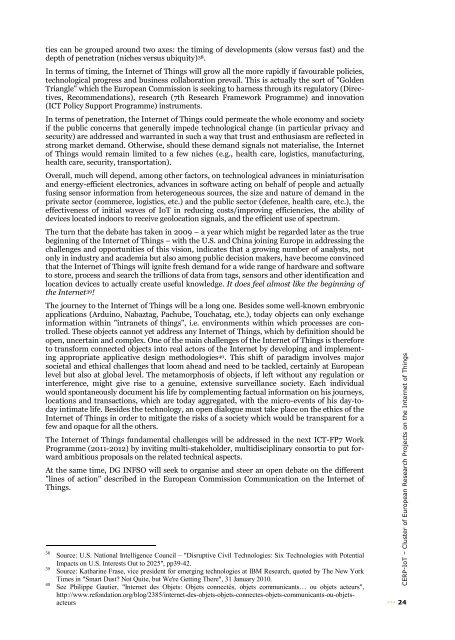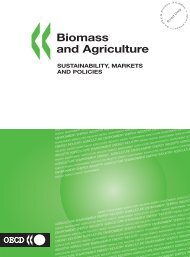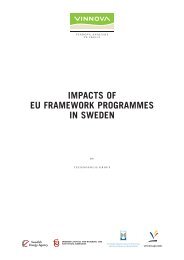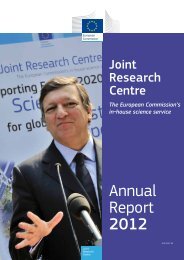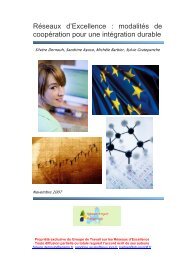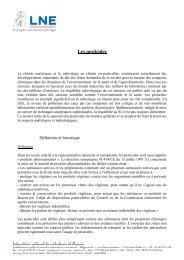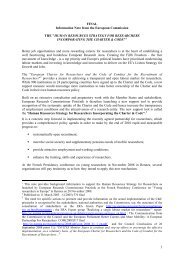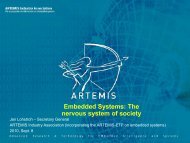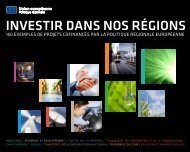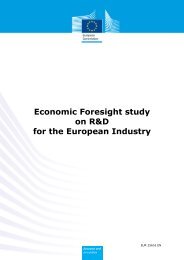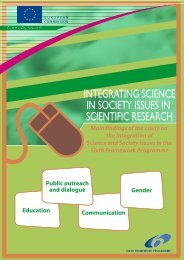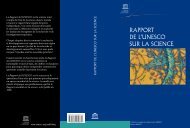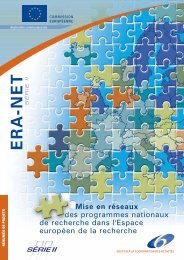Vision and Challenges for Realising the Internet of Things
Vision and Challenges for Realising the Internet of Things
Vision and Challenges for Realising the Internet of Things
You also want an ePaper? Increase the reach of your titles
YUMPU automatically turns print PDFs into web optimized ePapers that Google loves.
ties can be grouped around two axes: <strong>the</strong> timing <strong>of</strong> developments (slow versus fast) <strong>and</strong> <strong>the</strong><br />
depth <strong>of</strong> penetration (niches versus ubiquity) 38.<br />
In terms <strong>of</strong> timing, <strong>the</strong> <strong>Internet</strong> <strong>of</strong> <strong>Things</strong> will grow all <strong>the</strong> more rapidly if favourable policies,<br />
technological progress <strong>and</strong> business collaboration prevail. This is actually <strong>the</strong> sort <strong>of</strong> "Golden<br />
Triangle" which <strong>the</strong> European Commission is seeking to harness through its regulatory (Directives,<br />
Recommendations), research (7th Research Framework Programme) <strong>and</strong> innovation<br />
(ICT Policy Support Programme) instruments.<br />
In terms <strong>of</strong> penetration, <strong>the</strong> <strong>Internet</strong> <strong>of</strong> <strong>Things</strong> could permeate <strong>the</strong> whole economy <strong>and</strong> society<br />
if <strong>the</strong> public concerns that generally impede technological change (in particular privacy <strong>and</strong><br />
security) are addressed <strong>and</strong> warranted in such a way that trust <strong>and</strong> enthusiasm are reflected in<br />
strong market dem<strong>and</strong>. O<strong>the</strong>rwise, should <strong>the</strong>se dem<strong>and</strong> signals not materialise, <strong>the</strong> <strong>Internet</strong><br />
<strong>of</strong> <strong>Things</strong> would remain limited to a few niches (e.g., health care, logistics, manufacturing,<br />
health care, security, transportation).<br />
Overall, much will depend, among o<strong>the</strong>r factors, on technological advances in miniaturisation<br />
<strong>and</strong> energy-efficient electronics, advances in s<strong>of</strong>tware acting on behalf <strong>of</strong> people <strong>and</strong> actually<br />
fusing sensor in<strong>for</strong>mation from heterogeneous sources, <strong>the</strong> size <strong>and</strong> nature <strong>of</strong> dem<strong>and</strong> in <strong>the</strong><br />
private sector (commerce, logistics, etc.) <strong>and</strong> <strong>the</strong> public sector (defence, health care, etc.), <strong>the</strong><br />
effectiveness <strong>of</strong> initial waves <strong>of</strong> IoT in reducing costs/improving efficiencies, <strong>the</strong> ability <strong>of</strong><br />
devices located indoors to receive geolocation signals, <strong>and</strong> <strong>the</strong> efficient use <strong>of</strong> spectrum.<br />
The turn that <strong>the</strong> debate has taken in 2009 – a year which might be regarded later as <strong>the</strong> true<br />
beginning <strong>of</strong> <strong>the</strong> <strong>Internet</strong> <strong>of</strong> <strong>Things</strong> – with <strong>the</strong> U.S. <strong>and</strong> China joining Europe in addressing <strong>the</strong><br />
challenges <strong>and</strong> opportunities <strong>of</strong> this vision, indicates that a growing number <strong>of</strong> analysts, not<br />
only in industry <strong>and</strong> academia but also among public decision makers, have become convinced<br />
that <strong>the</strong> <strong>Internet</strong> <strong>of</strong> <strong>Things</strong> will ignite fresh dem<strong>and</strong> <strong>for</strong> a wide range <strong>of</strong> hardware <strong>and</strong> s<strong>of</strong>tware<br />
to store, process <strong>and</strong> search <strong>the</strong> trillions <strong>of</strong> data from tags, sensors <strong>and</strong> o<strong>the</strong>r identification <strong>and</strong><br />
location devices to actually create useful knowledge. It does feel almost like <strong>the</strong> beginning <strong>of</strong><br />
<strong>the</strong> <strong>Internet</strong>39! The journey to <strong>the</strong> <strong>Internet</strong> <strong>of</strong> <strong>Things</strong> will be a long one. Besides some well-known embryonic<br />
applications (Arduino, Nabaztag, Pachube, Touchatag, etc.), today objects can only exchange<br />
in<strong>for</strong>mation within "intranets <strong>of</strong> things", i.e. environments within which processes are controlled.<br />
These objects cannot yet address any <strong>Internet</strong> <strong>of</strong> <strong>Things</strong>, which by definition should be<br />
open, uncertain <strong>and</strong> complex. One <strong>of</strong> <strong>the</strong> main challenges <strong>of</strong> <strong>the</strong> <strong>Internet</strong> <strong>of</strong> <strong>Things</strong> is <strong>the</strong>re<strong>for</strong>e<br />
to trans<strong>for</strong>m connected objects into real actors <strong>of</strong> <strong>the</strong> <strong>Internet</strong> by developing <strong>and</strong> implement-<br />
ing appropriate applicative design methodologies<br />
40<br />
. This shift <strong>of</strong> paradigm involves major<br />
societal <strong>and</strong> ethical challenges that loom ahead <strong>and</strong> need to be tackled, certainly at European<br />
level but also at global level. The metamorphosis <strong>of</strong> objects, if left without any regulation or<br />
interference, might give rise to a genuine, extensive surveillance society. Each individual<br />
would spontaneously document his life by complementing factual in<strong>for</strong>mation on his journeys,<br />
locations <strong>and</strong> transactions, which are today aggregated, with <strong>the</strong> micro-events <strong>of</strong> his day-today<br />
intimate life. Besides <strong>the</strong> technology, an open dialogue must take place on <strong>the</strong> ethics <strong>of</strong> <strong>the</strong><br />
<strong>Internet</strong> <strong>of</strong> <strong>Things</strong> in order to mitigate <strong>the</strong> risks <strong>of</strong> a society which would be transparent <strong>for</strong> a<br />
few <strong>and</strong> opaque <strong>for</strong> all <strong>the</strong> o<strong>the</strong>rs.<br />
The <strong>Internet</strong> <strong>of</strong> <strong>Things</strong> fundamental challenges will be addressed in <strong>the</strong> next ICT-FP7 Work<br />
Programme (2011-2012) by inviting multi-stakeholder, multidisciplinary consortia to put <strong>for</strong>ward<br />
ambitious proposals on <strong>the</strong> related technical aspects.<br />
At <strong>the</strong> same time, DG INFSO will seek to organise <strong>and</strong> steer an open debate on <strong>the</strong> different<br />
"lines <strong>of</strong> action" described in <strong>the</strong> European Commission Communication on <strong>the</strong> <strong>Internet</strong> <strong>of</strong><br />
<strong>Things</strong>.<br />
38 Source: U.S. National Intelligence Council – "Disruptive Civil Technologies: Six Technologies with Potential<br />
Impacts on U.S. Interests Out to 2025", pp39-42.<br />
39 Source: Katharine Frase, vice president <strong>for</strong> emerging technologies at IBM Research, quoted by The New York<br />
Times in "Smart Dust? Not Quite, but We're Getting There", 31 January 2010.<br />
40 See Philippe Gautier, "<strong>Internet</strong> des Objets: Objets connectés, objets communicants… ou objets acteurs",<br />
http://www.refondation.org/blog/2385/internet-des-objets-objets-connectes-objets-communicants-ou-objetsacteurs<br />
CERP- IoT – Cluster <strong>of</strong> European Research Projects on <strong>the</strong> <strong>Internet</strong> <strong>of</strong> <strong>Things</strong><br />
24


